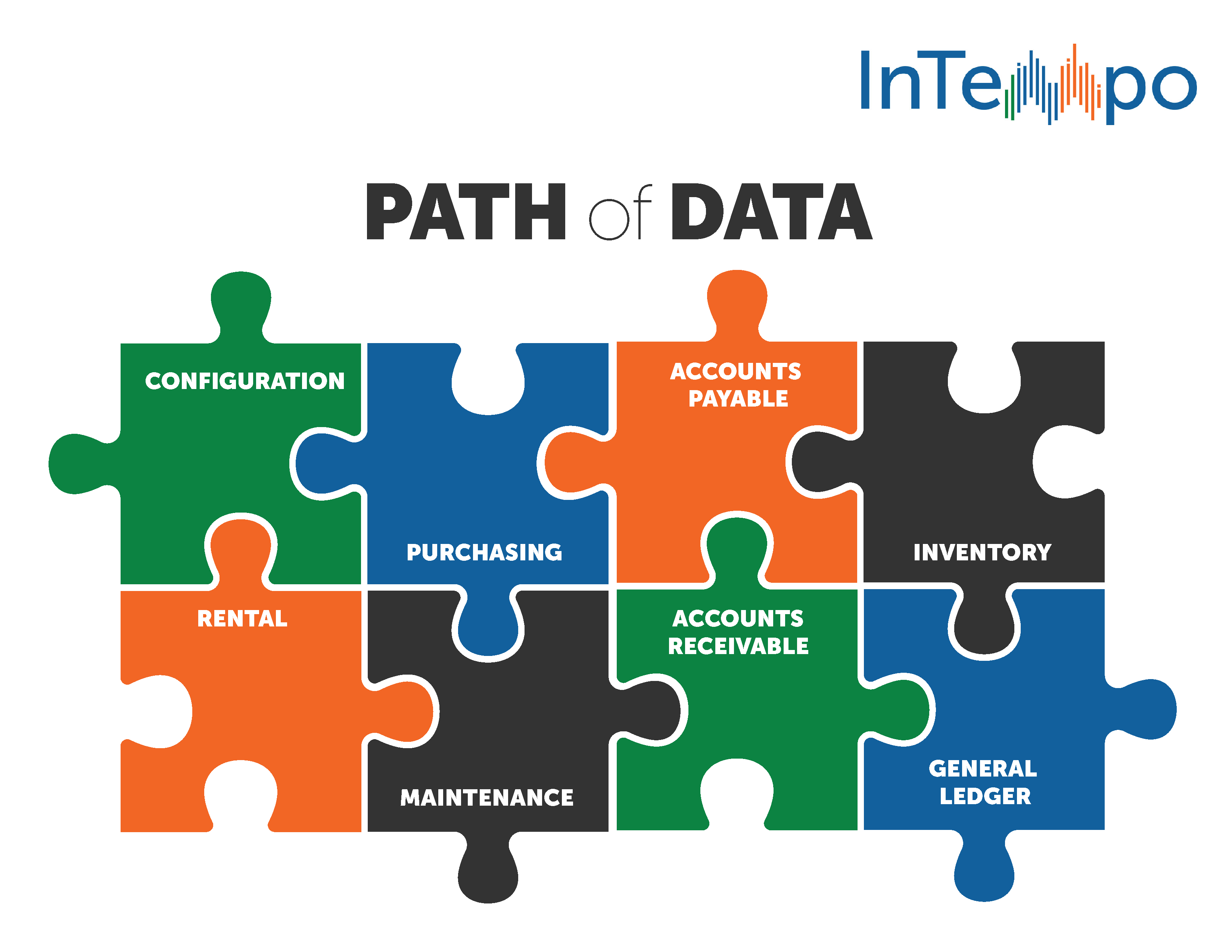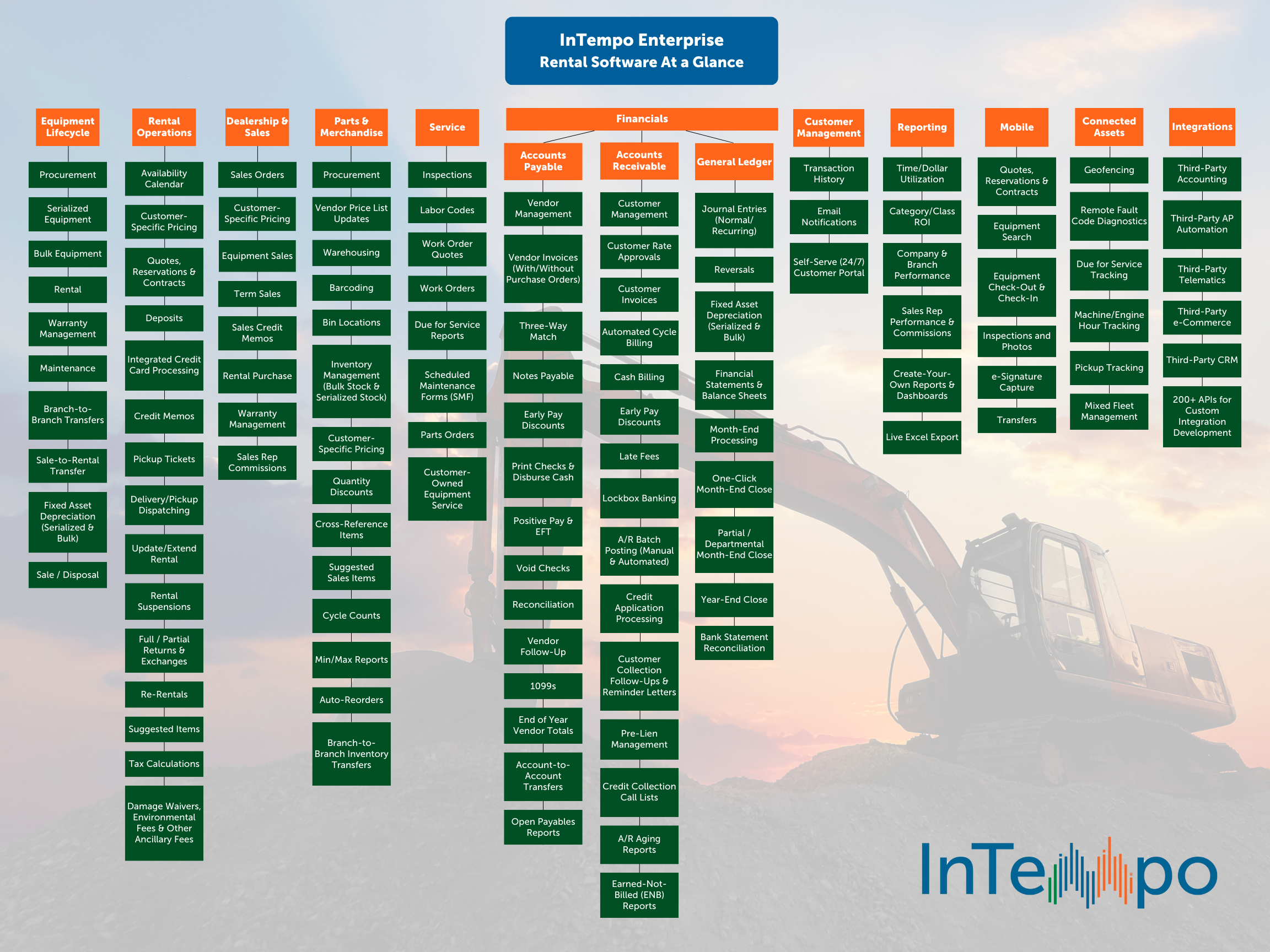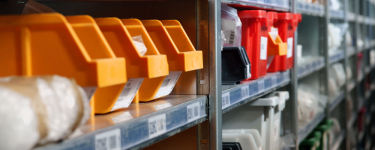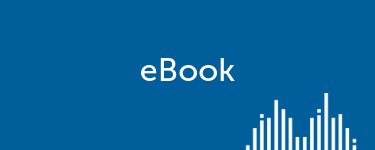Why A Rental ERP System May Be Right for You
Many business owners believe a rental ERP is “out of their league.” Whether they're a single-location startup or they don't think the construction equipment rental industry is "high-tech" enough to need a designated software solution, they feel like they don’t need the functionality or the expense of enterprise resource planning software. After all - they've been managing just fine with spreadsheets, paperwork, and point solutions so far ... right?
Change can also be a big deal. Some rental operators don't want to purchase rental management software because they don't want to change their established processes.
A prime example of this is back office functionality. If you’ve been managing your invoices with QuickBooks® or other off-the-shelf applications, migrating to a rental software system that doesn't use these third-party packages for your financials can be a major adjustment. But at the end of the day, change can be a good thing. If you’re looking to truly grow your rental business and get more efficient at everything from operations and maintenance to inventory and accounting, there are many benefits to using a rental ERP software system.
Companies that use InTempo's rental software achieve 2.5x the rental revenue of companies that use other solutions. Request a demo and find out why it's widely regarded as the best ERP solution in the rental industry.
What is a Rental ERP?
A rental ERP system is a suite of integrated applications that lets you manage your entire rental business.
Different packages will have different solutions, but true ERP systems will include - at minimum - base modules for accounting, day-to-day rental operations (such as writing contracts and creating reservations), inventory tracking, and maintenance. These systems can be cloud-based or installed on-site at your rental office; many even include options for mobile app access.
Collectively, this lets you integrate the front and back ends of your operation. There's a seamless flow of data that keeps everyone on the same page, and your most important processes become standardized. As a result, everyone from your counter team to your yard staff can work more efficiently.
A rental ERP system also helps you:
- Have one true reliable source for all your data – An ERP allows you to manage your entire rental process, end to end, on one platform. All your data is in one place - from your initial quote all the way through the final invoice. Similarly, equipment maintenance, depreciation, fixed asset management, and even forecasting take place on the same solution. Accounts receivable, accounts payable, and the general ledger are all unified. Having a central repository for data makes it easier to collect, access, and manage information across all areas of your rental operations (no more chasing down updates from spreadsheets and whiteboards!) At the same time, you’ll have more visibility into data for all stages of the rental process, including purchasing, quoting, reservations, rentals, repairs, maintenance, parts, billing, and collections. This lets you make more informed decisions to increase revenue and profitability, AND quickly respond to customer inquiries.
- Speed up critical rental operations – An ERP system eliminates repetitive processes and manual touches on your most common workflows. This, in turn, reduces the amount of time it takes your team to do their jobs. It helps you make better use of your resources, particularly your employees. Since all the moving parts of your business “talk” to each other, you can eliminate the roadblocks that come with manual work. This reduces frustration, speeds up your rental cycle, increases profitability, and lets you deliver better service to your customers.
- Reduce discrepancies – With a rental ERP platform, you get much more visibility into your business. This lets you quickly identify accounting errors and other potential discrepancies. Here's an example: if last week’s purchase order specified a $20,000 equipment purchase, and today’s vendor invoice shows $21,850, you can spot the issue and find a solution immediately because your Purchasing and Accounts Payable efforts are fully integrated.
- Improve accuracy An all-in-one software suite also helps you reduce human errors. Because you don't have to manually enter data into different systems over and over again, there's a lower likelihood of mistakes.
- Improve collaboration – Many rental companies use Excel® and other spreadsheet programs to analyze their data, but these platforms are limited in terms of allowing any type of collaboration. If your procurement team is working on one spreadsheet, your A/P team may not have access to the most recent updates. In contrast, a rental ERP lets you collaborate in real time. What happens at the rental counter is immediately visible in the back office; updates from your delivery drivers are viewable by your maintenance team. (Of course, you'll want to use security levels to make sure employees only have access to the right data, but this is easy to set up when you first start using the software.)
- Scale your rental business – Growing a rental business is hard. ERP technology makes it easier. You get a "single source of truth" for all your business processes, with the option to set up workflows any way you want them done. From there, your software makes sure those processes are adhered to 100 percent of the time. If you change your processes as your business grows - and you almost certainly will - you can easily adjust them in your rental ERP. You can even add third-party software integrations to do even more with your existing solutions. And, as you add more locations or employees, introduce new rental inventory lines, or even explore dealership sales, a fully scalable ERP will support your growth.

Think of it this way: even a small rental company is sitting on a mountain of data. From vendor invoices and warranty documents to customer information and jobsite data, you have many moving pieces to keep in order. A rental ERP solution doesn't just help you keep that data organized; it helps you turn it into actionable information. It's the "easy button" to becoming more efficient and making better decisions for company growth.
Choosing the Right Rental ERP
While a rental ERP can be more expensive than point solutions, the significant gains in efficiency, accuracy, and reporting far exceed the cost. In fact, most of the customers who use InTempo's rental software earn more than 2.5x the rental revenue per location than customers who use other solutions. That ROI is hard to ignore.
Of course, choosing the right ERP is critical to the success of your project - and not all solutions are created equal.
Some rental software companies claim to offer "all-in-one" enterprise resource planning solutions, but getting all the features requires an upgrade to a larger package. Or, they let you track some of your purchases on the base platform, but still require the use of third-party accounting software.
There's also the matter of industry specificity. Many "industry-agnostic" ERP systems exist in today's market. Because they're built to apply to a wide range of business types, they may not be able to account for the unique processes that occur on a daily basis in the rental industry. For instance, you may not be able to see which customers are currently in possession of individual pieces of equipment or set up inspection checklists for various pieces of machinery. Or, they may not be able to accommodate multi-location equipment depreciation or cycle billing. This can limit your ability to make full use of your ERP platform.
If you're thinking about taking your business to the next level with a rental ERP, be sure to thoroughly explore all your options and consider how they'll work in real-life applications. Involve your end users - not just your management team - as you evaluate options and find the right system for your needs. Check the pricing structure (do they charge license fees per branch, or per user? What will your maintenance agreement include?) as well as the various tiers of support that they offer on the back end.
InTempo's rental ERP is designed to help local and regional rental businesses level the playing with national chains. We deliver best-in-class functionality in an easy-to-use format, at a price point that makes sense for your industry. There's a reason our customers stay on our system for years on end; we're built to be the last rental software you'll ever need.
Check out everything you can do in InTempo's rental ERP:

If you'd like to see InTempo's enterprise resource planning software in action, request a demo here or contact us to learn more.


